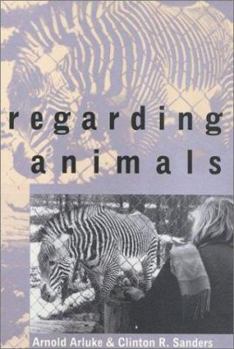Book Overview
Winner of the Charles Horton Cooley Award, Society for the Study of Symbolic Interaction, 1997The first edition of Regarding Animals provided insight into the history and practice of how human beings... This description may be from another edition of this product.
Format:Paperback
Language:English
ISBN:1566394414
ISBN13:9781566394413
Release Date:June 1996
Publisher:Temple University Press
Length:218 Pages
Weight:0.80 lbs.
Dimensions:0.7" x 5.5" x 8.2"
Customer Reviews
3 ratings
book review
Published by Thriftbooks.com User , 24 years ago
REGARDING ANIMALS, Arnold Arluke and Clinton Sanders, Philadelphia: Temple University Press, 1996, 218pp.Regarding Animals, by Arnold Arluke and Clinton Sanders, explores the special symbiosis that exists between human animals and non-human animals. Theirs is a sociological exploration navigated by their skills in ethnography that ventures them into cultural frontiers seldom seen and therefore left uncharted by sociological experts. For Arluke and Sanders, fieldwork took place wherever human-animal interaction was likely to occur, "the pet store, circus, riding stables, and countless other settings where animals play a part" (p. 19). This interaction united them with "exotic tribes" they identified as "pet owners, veterinarians, animal trainers, slaughterhouse workers, mounted policemen, and any other group that works with or cares for animals..." (p. 19). Arluke and Sanders attempt to record what was happening in these places and to articulate the meanings that animals have for people. Traditional sociological ethnography was the framework utilized for the authors' research. Their job as sociologists was to identify some of the social forces that are behind the inconsistent treatment of animals and to show how they work. Their ultimate goal was to convincingly argue the merits of sociological analysis in popular and scholarly discussions about animals in Western cultures. The purpose of Regarding Animals is to dissect how humans regard animals in modern Western societies. The book's format divides its discourse into two sections. Part one, "The Human-Animal Tribe," discusses a myriad of issues ranging from studying the social construction of animals to understanding ethnography to recognizing the existence of the non-human animal "mind." Particularly striking was Arluke and Sanders' rhetoric on social constructs. They regard the social construction of animals to be the meanings that animals have for cultures, and, consequently, determine them to be dependent upon the variables of place and time. Then, after a discussion of the criticisms of ethnography, the authors move on to the animal "mind," which can only be described as a modern paradigm drama. Arluke and Sanders testify to the "mind's" existence, and consequently refute conventional positivistic assumptions by reasoning that the animal "mind" is capable of more than just capricious, instinctual thought response.In the next section, Living with Contradiction, ethnography plays a key role. The authors infiltrate the world of animal shelter workers, animal trainers, primate labs, and the history of Nazi Germany. The chapter entitled The Sociozoologic Scale was particularly compelling. The scale ranks animals "according to how well they seem to `fit in' and play the roles they are expected to play in society" (p. 169). Arluke and Sanders deduce that society constructs good animals and bad animals. They discuss the latter as being characterized as freaks, vermin, and demons. Good animals, chara
Wowser Bowser!
Published by Thriftbooks.com User , 24 years ago
Golly gosh, this was the best book on animals I ever read. I immediately went out and bought a little parrot after reading it, who only says one thing: "I love jesus, I love jesus."
Factual, interesting and informative - a gripping read.
Published by Thriftbooks.com User , 26 years ago
An excellent book covering many aspects of our interaction with non-human animals. Packed with information, interesting examples and a wonderfully useful bibliography, I couldn't put it down. A real shame there's not more books like this, as a student of human-animal interaction I could have done with reading something as comprehensive as this years ago. I particularly liked the application of symbolic interactionist theory to this area of study.






